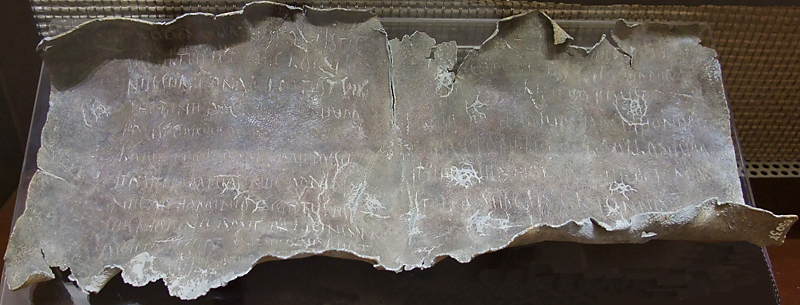
Lead curse tablet, late 1st century BCE. CIL 1.2.1012a, 1.2.1012b
The author of this love curse is unknown, nor is it known whether the author inscribed the words or hired a professional scribe. The object is clear, however — a jealous lover, male or female, attempts to sever the relationship between Rhodine, a woman with a Greek name who might have been a freedwoman or a slave, and Marcus Licinius Faustus, whose tria nomina identify him as a Roman citizen of an ancient gens. The curse does not seek to kill or maim Rhodine, but rather to nullify her erotic power over Faustus. The text was inscribed with a stylus in two uneven columns on a sheet of lead: the left column contains 11 lines of writing, the right 7 (lines 12-18 below). The last four lines contain the names of four freedpersons, two men and two women, similarly cursed (item), but it is not clear whether they had any relationship to Rhodine and Faustus or whether the author just made use of a good opportunity to curse a few other enemies. The sheet was tightly rolled and buried in the grave of a man (mortuos, sepultus); it was found in a tomb in 1852 along the Via Latina, one-half mile from Rome. Based on the letters and spelling, the artifact has been assigned to the end of the Republican period or during the Augustan age (31 BCE-14 CE). The unusual orthography, in which -II is written for -e, may have been employed to increase the potent magic of the curse. For further information on curses and witches, see Defixiones, Horace's Canidia; M. Hanses (2022), Ogden, Paule (2017), K. Stratton (2007) in the Bibliography.
.| Quomodo mortuos qui istic | 10accepta sit et tantum valeat | |
| sepultus est nec loqui | quantum ille mortuos quei | |
| nec sermonare potest, seic |
|
|
| Rhodine apud M[arcum] Licinium | tibi commendo, uti semper | |
| 5 Faustum mortua sit nec | odio sit M[arco] Licinio Fausto; | |
| loqui nec sermonare possit. | 15item M[arcum] Hedium Amphionem | |
| Ita uti mortuos nec ad deos | item C[aium] Popillium Apollonium | |
| nec ad homines acceptus est, | item Vennonia[m] Hermonia[m] | |
| seic Rhodine aput M[arcum] Licinium | item Sergia[m] Glycinna[m] |
Click on the underlined words for translation aids and commentary, which will appear in a small window. Click on the icon link![]() to the right of the text for related images and information.
to the right of the text for related images and information.